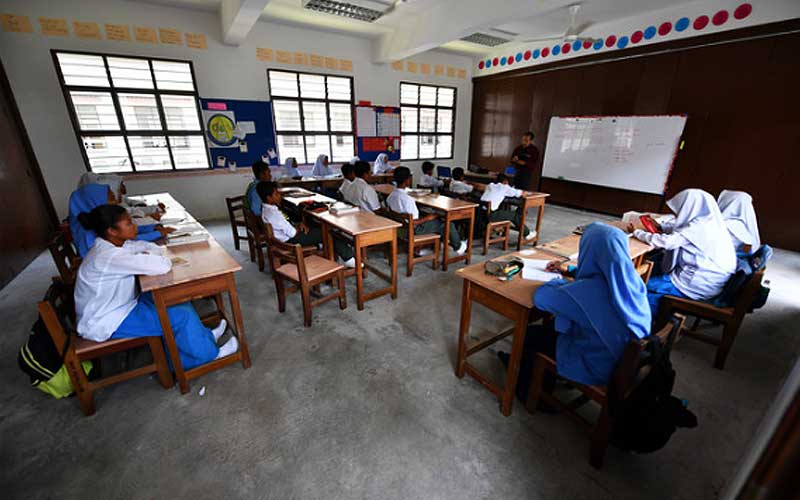
Is there anything wrong in the use of Bahasa Malaysia as the medium of instruction in the teaching and learning of Mathematics and Science in schools?
Will children among the rural poor be disadvantaged by the introduction of PPSMI?
Does the revival of PPSMI provide a democratic solution in the choice of language for Science subjects?
Generations of students have done well both in the urban and rural areas using Bahasa Malaysia in the teaching and learning of Science subjects.
Chest beating by a few does not render Bahasa Malaysia an obsolete language for the PPSMI programme, just like the appearance of a swallow does make summer.
Even if students in rural schools might have been disadvantaged due to their socio-economic background, the use of Bahasa Malaysia as their mother tongue gave them the opportunity to understand the Science subjects better than using English, which is not their mother tongue.
Similarly, students in Chinese vernacular schools excelled in Science and other subjects by using their mother tongue, Chinese, so much so that Chinese schools have been praised time and again for producing excellent students in Science subjects.
Nearly 15% of the enrolment in Chinese schools consists of Malay students. Malay parents send their children to Chinese vernacular schools not only because they want to learn the Chinese language but also to excel in Science subjects.
Tamil schools might not have produced excellent students in the past, with a few exceptions, but over the last decade or so, the quality of Indian students has improved due to the nature of class composition, as more and more middle-class Indian parents are sending their children to over more than 500 Tamil schools in the country.
The experience of Chinese and Tamil schools illustrates that teaching and learning of Science subjects in their respective mother tongue is not a constraint but, on the contrary, has proven advantageous.
Why should this be any different in national schools where the medium of instruction is Malay? Just because major technological and scientific innovations get disseminated through the English medium does not mean we have to change the medium of instruction in schools from Malay to English, at least for Science subjects.
In the national primary and secondary schools, there are some ominous indications that students are not keen on Science subjects. In secondary schools, there is a steady decline of students taking up Science subjects.
I am not sure whether the growing disinterest in Science subjects has anything to do with the language of instruction rather than the way the subjects are being taught, the nature of the curriculum, the pedantic nature and, not least, overly theoretical emphasis without the practical dimension.
It is not really about the language of instruction but the teaching and learning methods that are used uncritically in schools without tuning in to the needs of science and technology.
Bringing about effective teaching and learning of Science subjects is not so much about switching languages but to critically examine how these subjects are being taught in schools and why there is disinterest in these subjects.
With so much of time, energy, planning and development gone into the teaching of Mathematics and Science in Bahasa Malaysia, it would be absurd to revive a programme that was abandoned 10 years ago.
This is apart from its impracticality, nationalist opposition and, most importantly, undermining a language out of sheer expediency to replace with another.
The matter of introducing the PPSMI cannot be merely reduced to a class phenomenon unless, of course, there is explicit class agenda behind the move. In a country like Malaysia, where class implications are obvious, the issue of PPSMI might be much more complex and political in nature.
Class reductionism might not explain the superstructural elements that go along with the PPSMI.
Some say that revival of the failed PPSMI might have something to do with the intention to dilute the mother tongue content of the vernacular schools. I am not sure about this.
But PPSMI’s sudden revival without much consultation raises a number of questions that can only be answered by the government or Prime Minister Dr Mahathir Mohamad.
The PPSMI, if introduced, might pose a problem particularly for national schools. It is not merely the question of implementation or the opposition to it, but how the government is going to deal with the opposition that might go full length in politically capitalising on the matter.
Even the Dual Language Progamne (DLP), which gave a choice to schools in the use of Bahasa Malaysia or English in the teaching of Science subject, has not really taken off as expected.
While some Tamil vernacular schools have accepted the idea, the Chinese schools are opposed to the DLP programme which they simply see as a covert attempt to dilute the vernacular schools system.
P Ramasamy is deputy chief minister II of Penang. - FMT


No comments:
Post a Comment
Note: Only a member of this blog may post a comment.